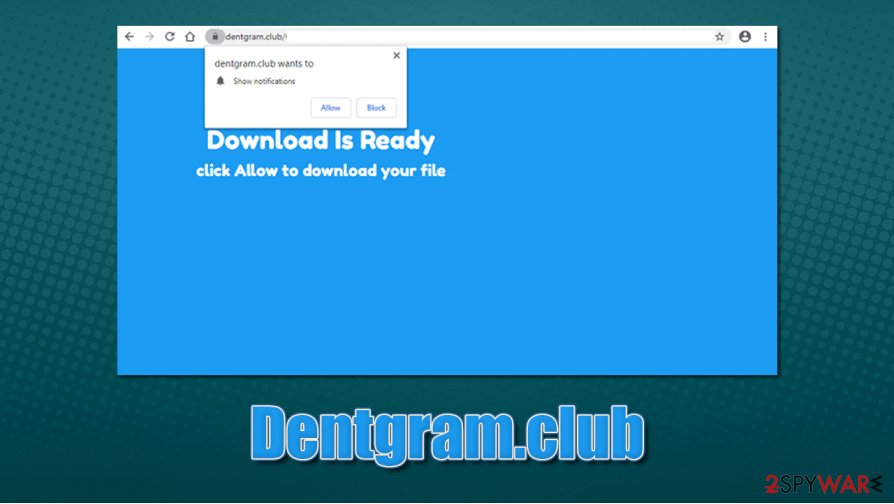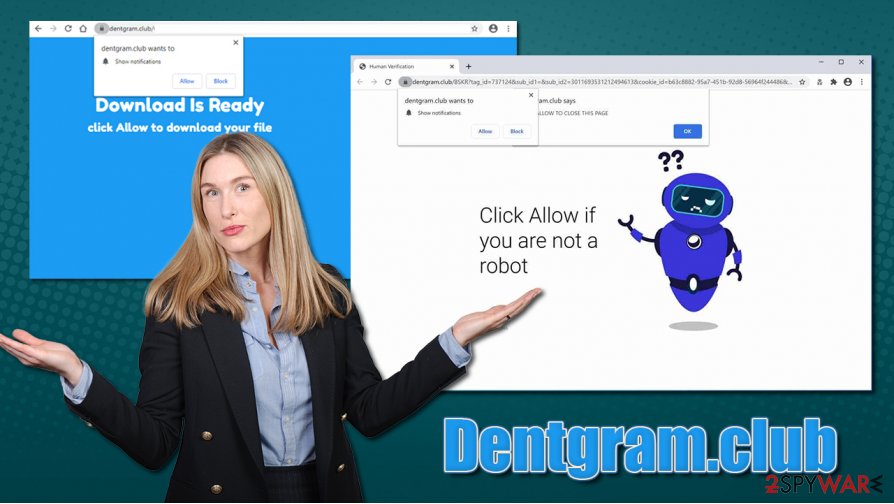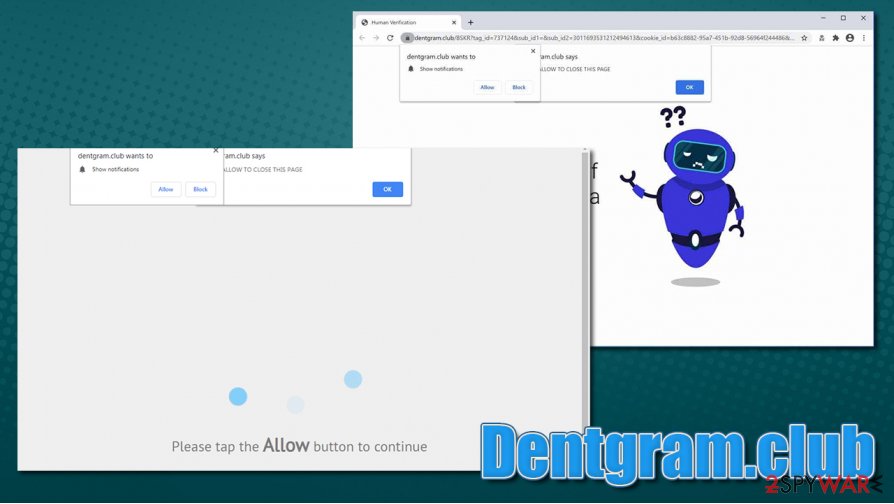Dentgram.club is a push notification virus that can be caused by adware

Dentgram.club is a suspicious website that asks users to enable notifications that later bring ads to their desktops

Dentgram.club is a suspicious website that asks users to enable notifications that later bring ads to their desktops
Dentgram.club is a suspicious website that you might encounter unexpectedly during your web browsing sessions on Google Chrome, Mozilla Firefox, Safari, or another web browser. As soon as you enter the site, you will be asked to allow notifications to be shown in order to bypass human checks, which ensure that you are not a bot,[1] or that some type of download is ready for you. However, it is just a scam compiled in a way that would allow third-parties to monetize on Dentgram.club ads that will be shown directly on your desktop, regardless if your browser is running or not.
Due to the sudden appearance of suspicious notifications, users might call the phenomenon Dentgram.club virus, although the term is not precisely correct. The unwanted ads that show up on your desktop can be eliminated by accessing your web browser settings, although, if you were a victim of this scam, it is also wise to check the computer for adware. Check the detailed Dentgram.club removal instructions below.
| Name | Dentgram.club |
| Type | Rogue website, although redirects to it might be caused by adware infection |
| Infiltration | After pressing the “Allow” button which allows showing notifications via the browser pop-up prompts; adware is most commonly installed along with other software from third-party websites (software bundling) |
| Symptoms | Intrusive desktop notifications show up on the desktop at any time, promoting websites of dubious content |
| Risks | Since the ads displayed by the website might be dangerous, users might suffer from financial losses, installation of malware/PUPs, or sensitive information disclosure to unknown parties |
| Elimination | To get rid of notifications, you should access the settings of your web browser how it is explained below |
| Additional steps | You should also check your system for adware ad eliminate it with security software or by using a manual guide. Experts[2] also recommend fixing virus damage with repair software (we recommend Reimage Reimage Cleaner Intego) and resetting web browser settings for best results |
Dentgram.club is one of many websites that abuses legitimate web browser notification features, which are often used by various websites in order to notify users who are interested in that site’s content. Examples include Pushails.com, Stewaysef.info, Edundedpra.club, Streampro.club, and many others. While it might seem like these sites have nothing to do with each other, they all have a common goal – to mislead users.
Typically, Dentgram.club would show a message where the page content is located. Various themes are used by crooks although all of them include social engineering techniques, for example:
- Website promises to play a video which looks like one from YouTube;
- Website asks to confirm that the visitor is not a robot;
- Website inclines that +18 content will be shown as soon as “Allow” button is pressed;
- Website claims that a download is ready, although there is no mention of what type of download it is.
However, those who get tricked by crooks and press the allow button, they will see that the promised content is nowhere to be seen, and they are simply returned to the same page. Instead, visitors will start encountering Dentgram.club notifications that will be delivered directly to the desktop.

Dentgram.club is a site that could be related to various adware campaigns

Dentgram.club is a site that could be related to various adware campaigns
Since users get tricked into allowing desktop ads, they might not be aware that these prompts are coming from the browser. Hence, they would not know how to remove Dentgram.club notifications for good. Luckily, this can be easily reverted by accessing your web browser settings and declining the site to show notifications – we explain how to do that below.
However, you should also be aware that you might also be infected with adware or malware since redirects to suspicious sites such as Dentgram.club can be caused by computer viruses. To make sure that this is (not) the case, we suggest you perform a full system scan with anti-malware software or eliminate all the potentially unwanted programs manually.
If you find malware on your device, you should also perform additional checks with Reimage Reimage Cleaner Intego, as malicious software can permanently damage system files, which can result in serious stability issues and crashes.
Learn to avoid being tricked by deceptive websites
Online fraud is extremely widespread, with millions of computer users losing money to scams and suffering from malware infections. Since most of the planet is now using the internet, scams can be a very profitable business for cybercriminals, hence malicious websites are created on a daily basis on a massive scale. You should take adequate steps in order to protect your computer and your personal information from online dangers.
Common scam themes include:
- Push notification feature abuse. This feature is legitimate and was started being used in 2014 by Google Chrome. Soon after, other browsers adopted it. However, a push notification feature is often abused by scammers to trick users into subscribing to ads that would show up on their desktops. These ads are often of a malicious nature.
- Fake Flash Player notifications. Flash Player is an outdated and flawed plugin that should not be used. Nevertheless, scammers constantly use the prominent name of the previously widely-used software in order to make users believe that they need to install the alleged updates on their machines. Fake Flash updates remain one of the leading causes of adware and malware infections.[3]
- Fake virus infection claims. Users who never encountered an online scam before might easily fall for it. As soon as they enter a malicious website, they are told that their computer is infected and that their personal details are being stolen. Users are then asked to call alleged tech support or download malicious applications to remove the fake virus infection.
Thus, do not interact with malicious websites that push scams like the ones mentioned above and simply leave the page immediately. A powerful web protection application could also warn you about fraud, spoofing, and other malicious websites.

Dentgram.club ads and notifications show up on screen regardless if the web browser is switched off

Dentgram.club ads and notifications show up on screen regardless if the web browser is switched off
Delete Dentgram.club notifications and check your system for infections
While Dentgram.club notifications might not be related to any type of infection on your system (since you enabled it via the website), redirects to this and other malicious sites could be caused by an adware. The so-called ad-supported software is designed to show users intrusive ads in forms of popups, deals, offers, banners, coupons, and track their online activity in the background. Thus, Dentgram.club removal might not be the only thing that you have to take care of in order to keep your computer clutter-free. To get rid of unwanted apps, check the manual guide below. You can also scan the device wit powerful anti-malware software to eliminate malware automatically.
To remove Dentgram.club popups and notifications, you should follow these instructions:
Google Chrome
- Go to Menu > Settings
- Scroll down and select Advanced
- Under Privacy and security, click Site Settings > Notifications
- In the Allow section, look for Dentgram.club
- Click More Actions and then choose Block
Safari:
- Go to Safari > Preferences…
- Under Websites tab, pick Notifications
- Select Dentgram.club and then click Deny
Mozilla Firefox:
- Go to Menu > Options
- Choose Privacy & Security > Notifications
- Pick Settings – you should see Dentgram.club there
- Click on the the drop-down menu and select Block
- Save Changes
You may remove virus damage with a help of Reimage Reimage Cleaner Intego. SpyHunter 5Combo Cleaner and Malwarebytes are recommended to detect potentially unwanted programs and viruses with all their files and registry entries that are related to them.
Online spying has got momentum in recent years and people are getting more and more interested in how to protect their privacy online. One of the basic means to add a layer of security – choose the most private and secure web browser. Although web browsers can’t grant a full privacy protection and security, some of them are much better at sandboxing, HTTPS upgrading, active content blocking, tracking blocking, phishing protection, and similar privacy-oriented features.
Nevertheless, there’s a way to add an extra layer of protection and create a completely anonymous web browsing practice with the help of Private Internet Access VPN. This software reroutes traffic through different servers, thus leaving your IP address and geolocation in disguise. Besides, it is based on a strict no-log policy, meaning that no data will be recorded, leaked, and available for both first and third parties. The combination of a secure web browser and Private Internet Access VPN will let you browse the Internet without a feeling of being spied or targeted by criminals.
While much of the data can be accidentally deleted due to various circumstances, malware is also one of the main culprits that can cause loss of pictures, documents, videos, and other important files. Potentially unwanted programs may clear files that keep the application from running smoothly.
More serious malware infections lead to significant data loss when your documents, system files, or images get locked. In particular, ransomware is is a type of malware that focuses on such functions, so your files become useless without an ability to access them. Even though there is little to no possibility to recover after file-locking threats, some applications have features for data recovery in the system.
In some cases, Data Recovery Pro can also help to recover at least some portion of your data after data-locking virus infection or general cyber infection.

